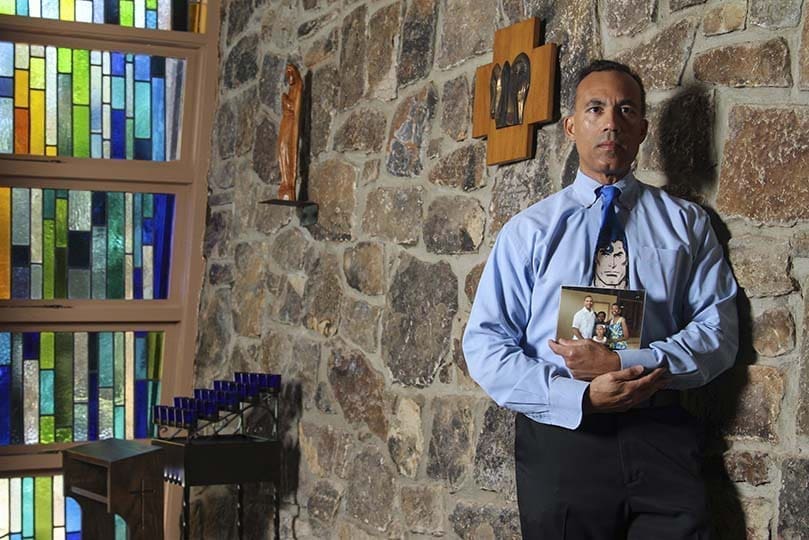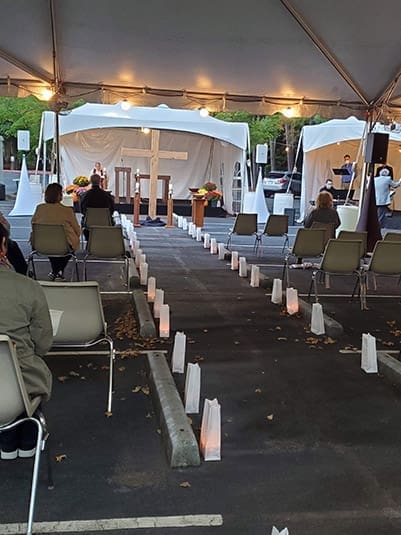 Photo By Michael Alexander
Photo By Michael AlexanderAtlanta
A sense of community can help those grieving in a pandemic
By SAMANTHA SMITH, Staff Writer | Published October 29, 2020
ATLANTA—Donald Jeanne met his wife, Anita, in high school more than 30 years ago. They became good friends and began dating later in life. They were married on the first day of the year 2000, the Solemnity of Mary, Mother of God, at St. Paul of the Cross Church, Atlanta.
Donald and Anita shared many joys over the years, including the birth of two daughters, Isabella, 12, and Sophia, 10. In recent years, the Jeanne family were members of Most Blessed Sacrament Church in Atlanta.
After a four year battle with cancer, Anita died Oct. 28, 2019. She was 50.
Jeanne remembers the fun times they had as teens that they later shared with their children, such as going to the movies.
“We had a dream marriage, from the get-go,” he said. “We were definitely going to make the golden anniversary.”
The Jeanne family is one of many processing grief in the time of a pandemic. While many are grieving the loss of loved ones due to other causes, more than 220,000 people in the United States have died from the coronavirus. Of those, more than 7,400 have died in Georgia.
Grief in a pandemic
Initial grief is dealing with the awareness that you’ve had this terrible loss and then you move into bereavement, where you remember the person and have lots of memories, said Dr. Ann Howe, a Catholic psychologist and court expert for the Metropolitan Tribunal at the Archdiocese of Atlanta.
You have to do your own grieving—it’s a psychological, social and physical process, she said.
Usually, there is a process called mourning, which refers to the rituals and events shared with other people, said Dr. Howe.
“That sense of right continuity within your community, that has been taken away or a large part taken away from people or modified by the pandemic,” said Howe about how the process has changed.
In response to the COVID-19 pandemic, the Centers for Disease Control and Prevention recommended various practices, such as social distancing, wearing masks and limiting gatherings. And while these practices help to protect people from the coronavirus, they also isolate people from one another.
“Grief is awful,” said Jeanne. “But to stay in the house constantly feeling empty and lonely without respite is hard to say the least. It’s a loneliness that can’t be described.”
Dr. Eric M. Plakun, medical director and CEO of Austen Riggs Center in Massachusetts, talked about blocked mourning in a recent newsletter. Blocked mourning is when people are prevented, by circumstance or other means, from moving through the bereavement, grief and rituals that generally accompany major losses.
“Because of the uncertainty created by the pandemic on all sorts of levels, people are under more stress and experiencing more anxiety,” said Howe.
Bereavement has been interrupted because people have anxiety about just day-to-day survival, she said.
Community and faith
On a fall Friday evening, about 50 people held candles and gathered under tents at St. Thomas Aquinas Church, for a prayer vigil in remembrance of the more than 200,000 people who have died due to the coronavirus.
A vigil was held previously when the number of deaths passed 100,000 lives lost due to the pandemic.

Parishioners gathered at St. Thomas Aquinas Church, Alpharetta, for an outdoor prayer vigil on the evening of Oct. 2 in remembrance of the more than 200,000 lives lost due to COVID-19. Community events can help participants process grief as a society and on a personal level. Photo by Samantha Smith
“We recommit ourselves to be a people of charity, to see our mask wearing, our social distancing, and our isolation as gifts of love to others,” said Father Paul Berny, priest in residence at St. Thomas Aquinas parish.
“We will continue to do these things despite the inconvenience they bring all because we believe we demonstrate our love of God by loving each other,” he said at the Oct. 2 event.
Through the ups and downs of grief, Jeanne found support through a GriefShare group at Holy Trinity Church in Peachtree City. GriefShare is a Christian organization for people grieving the death of a family member or friend.
“It’s been very helpful,” said Jeanne. “I wish I had joined sooner.”
Kathleen “Kathy” DiBlasi, coordinator of the group at the Peachtree City parish, joined GriefShare shortly after moving to Georgia in 2013. She lost her husband of nearly 32 years, Ted, in 2011. Within that same year, her brother and father died suddenly and she lost a nephew.
“It just rocked my life,” said DiBlasi. “It felt like I was being kicked in the stomach and couldn’t get my breath.”
GriefShare helped DiBlasi deal with her grief, even though she lost her loved ones more than a year prior. The group shares their experiences and feelings and encourages journaling and reflection.
Society tells the grieving to get over it, said DiBlasi. She doesn’t think people ever get over losses, rather it’s a journey through it and a surrender to it.
“It’s the hardest thing in my whole life,” said DiBlasi. “If I did not have my faith, I wouldn’t be able to get through it.”
Jeanne has experienced a crisis of faith in his grieving process.
“You know that God is not a good luck charm,” he said. “But nevertheless, you can always feel like you have this kind of divine protection from the worst of life. And then the worst of life comes, and it really is a test of faith and a crisis of faith.”
When businesses and churches began shutting down in March due to the coronavirus, GriefShare stopped having in-person meetings, but quickly moved them online.
“We’re hearing from our participants how they were really suffering through this time of isolation,” said DiBlasi. “This is the time we need to be with our other loved ones, we need to be with people.”
In August, the GriefShare group gathered for a backyard event, being as careful as possible. Upcoming sessions will discuss how to survive the holiday season.
Jeanne’s job requires him to travel. But with restrictions due to the pandemic, he’s found it helpful to stay at home with his two daughters. While he’s experienced a crisis of faith, he believes in the hope of heaven.
Howe encourages those experiencing grief to reach out for support. She acknowledges a natural resistance to sharing personal information in a group setting. But it does work—people are meant to be there for each other, she said.